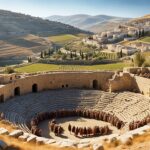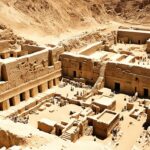The Bible is a treasure trove of stories, teachings, and wisdom that have shaped the course of human history. Within its pages, the scriptures mention numerous places, lands, and nations that hold significant religious, historical, and cultural importance. In this article, we will delve into 25 important places in the Bible, exploring their rich narratives and the profound impact they have had on different faith traditions.
From the birthplace of Jesus in Bethlehem to the ancient city of Jericho with its famous walls, these places offer us a glimpse into the events and miracles that have shaped our understanding of spirituality. Whether you are a devoted Christian, a curious historian, or simply intrigued by the stories within the Bible, these biblical landmarks and famous sites will undoubtedly fascinate and inspire you.
So join us as we embark on a journey to discover the significant biblical locations that have captured the hearts and minds of people for centuries. Let’s delve into the stories and unravel the mysteries of these sacred places, shedding light on their significance and the messages they convey.
Key Takeaways:
- Exploring 25 important places in the Bible unveils a rich tapestry of historical and spiritual significance.
- These biblical landmarks and famous sites offer insights into the stories and teachings that continue to shape the beliefs of millions.
- From Bethlehem, the birthplace of Jesus, to Jericho with its fallen walls, each place holds a unique narrative waiting to be discovered.
- By delving into these sacred locations, we can deepen our understanding of the biblical texts and the enduring messages they impart.
- Embark on a journey through time and faith as we uncover the stories woven within these significant biblical locations.
Absalom’s Monument
Absalom’s Monument is a significant biblical landmark that holds a place of prominence in the Bible. This monument is intrinsically tied to the captivating story of Absalom, King David’s rebellious son. Absalom’s Monument serves as a solemn reminder of Absalom’s defiance and eventual downfall, making it a revered site for believers and historians alike.
“Now Absalom in his lifetime had taken and set up for himself the pillar that is in the King’s Valley, for he said, ‘I have no son to keep my name in remembrance.’ He called the pillar after his own name, and it is called Absalom’s Monument to this day.” – 2 Samuel 18:18
The tale of Absalom’s rebellion against his father is a tale of family strife, betrayal, and consequences. This biblical landmark serves to remind us of the complexities and consequences of our actions, making it a place of reflection and introspection.
Visiting Absalom’s Monument provides believers with the opportunity to delve deeper into the rich tapestry of biblical narratives and gain a greater understanding of the moral lessons embedded within. It stands as a testament to the enduring power of biblical stories and the impact they have on our collective consciousness.
Notable Features of Absalom’s Monument
| Feature | Description |
|---|---|
| Location | Absalom’s Monument is situated in the King’s Valley, near Jerusalem. Its close proximity to the Holy City adds to its significance for pilgrims and tourists. |
| Design | The monument is a stone pillar, symbolizing endurance and permanence. Its grandeur and craftsmanship showcase the reverence and importance accorded to Absalom’s memory. |
| Biblical Significance | The story of Absalom’s rebellion and his ultimate fate serves as a cautionary tale, emphasizing the consequences of pride, ambition, and familial discord. Absalom’s Monument stands as a tangible reminder of these lessons for generations to come. |
Exploring Absalom’s Monument provides visitors with an opportunity to delve into the depth of biblical history and witness firsthand the physical remnants of the stories that have shaped our religious and cultural heritage. It is a testament to the enduring power of biblical landmarks in preserving and transmitting narratives across generations.
Bethlehem
Bethlehem is widely known as the birthplace of Jesus, making it one of the most significant biblical landmarks. For Christians around the world, Bethlehem holds immense religious importance as it is where the story of Jesus’ birth unfolds.
“And she brought forth her firstborn Son, and wrapped Him in swaddling cloths, and laid Him in a manger, because there was no room for them in the inn.” – Luke 2:7
The biblical narrative tells us that Jesus was born in a humble manger in Bethlehem, fulfilling the prophecies of the Messiah’s arrival. This event marks a pivotal moment in Christian history and serves as the foundation of the Christian faith.
Bethlehem, located in the West Bank, is visited by countless pilgrims and tourists who seek to experience the spiritual atmosphere and connect with the birthplace of Jesus. The city is home to the Church of the Nativity, one of the oldest continuously operating churches in the world. This sacred site is believed to be built upon the exact spot where Jesus was born.
Exploring Bethlehem allows visitors to immerse themselves in the biblical narrative and witness the historical and religious significance of this ancient city. Walking through the streets, one can reflect upon the birth of Jesus and the profound impact it has had on human history.
Jericho
Jericho is an ancient city with significant biblical importance. It is mentioned in the Bible for its famous walls that were miraculously brought down by the Israelites under the leadership of Joshua. This biblical event is a testament to the power of faith and divine intervention. Today, Jericho is located in Jordan and is known for its rich history and archaeological sites.
Jericho holds a special place among the biblical landmarks, attracting tourists and pilgrims from around the world. Visitors can explore the archaeological remains of the ancient city, including its famous walls and other structures. The city offers a glimpse into the vibrant past and provides a deeper understanding of the biblical narratives. Jericho’s historical and religious significance makes it a must-visit destination for those interested in biblical history.

The image above depicts the ancient ruins of Jericho, standing as a testament to its rich biblical heritage. These ruins serve as a tangible reminder of the biblical accounts and attract visitors seeking to connect with the ancient history of the region.
| Key Features | Significance |
|---|---|
| The Walls of Jericho | The miraculous downfall of Jericho’s walls showcases the power of faith and divine intervention. |
| Archaeological Sites | Jericho’s archaeological remains provide insights into the city’s ancient civilization and biblical events. |
| Tourist Destination | Jericho’s historical and biblical importance attracts tourists and pilgrims from around the world. |
Visiting Jericho allows individuals to immerse themselves in biblical history and experience the awe-inspiring stories firsthand. Exploring the ancient ruins and learning about the biblical events associated with Jericho provides a deeper connection to the scriptures and enhances one’s understanding of the faith. Jericho stands as a significant biblical landmark, offering a remarkable journey through time and spirituality.
Mount Sinai
Mount Sinai is a legendary biblical landmark that holds great religious significance for Judaism, Christianity, and Islam. It is known as the mountain where Moses received the Ten Commandments from God, a pivotal event in the Abrahamic faiths.
The exact location of Mount Sinai remains uncertain, but it is widely believed to be situated in the Sinai Peninsula, a triangular peninsula in Egypt. Despite the lack of precise geographical evidence, the spiritual and historical significance attributed to Mount Sinai is profound.
For centuries, pilgrims and explorers have ventured to the Sinai Peninsula in search of this holy mountain. The awe-inspiring beauty and timeless aura that surround Mount Sinai have captivated the hearts and minds of believers and history enthusiasts alike.
“And there was Mount Sinai completely in smoke, because the Lord descended upon it in fire. Its smoke ascended like the smoke of a furnace, and the whole mountain quaked greatly.” – Exodus 19:18
Embarking on the journey to Mount Sinai is an experience that brings individuals closer to the biblical narrative and allows them to connect with the profound spirituality associated with this sacred site. As visitors ascend the mountain, they not only glimpse the physical beauty of the Sinai Peninsula but also encounter a sense of transcendence and spiritual awakening.
Table: Significant Biblical Locations
| Biblical Landmark | Significance |
|---|---|
| Mt. Sinai | The mountain where Moses received the Ten Commandments |
| Bethlehem | The birthplace of Jesus |
| Jericho | Famous for its fallen walls in the biblical story of Joshua |
| Goshen | A sanctuary for the Israelites during their enslavement in Egypt |
If you are planning a pilgrimage or simply seeking a deeper connection to biblical history, a visit to Mount Sinai can be a profoundly enriching experience. The journey to this sacred mountain allows you to walk in the footsteps of Moses and witness the power of divine revelation.

Canaan
In the Bible, Canaan is referred to as the ancient land where the patriarchs of Israel resided. This significant biblical location was known as the Promised Land, which God directed Abraham to settle in. Canaan encompassed areas that are now part of modern-day Israel, Gaza, Jordan, Lebanon, and Syria. It holds great historical, spiritual, and cultural importance in the biblical narratives.
According to biblical accounts, the Israelites embarked on a journey from Egypt to Canaan, led by Moses. The conquest of Canaan was a crucial event in the Old Testament, as it marked the fulfillment of God’s promise to the Israelites. The story of Joshua and the walls of Jericho is one of the iconic tales associated with the Israelites’ conquest of Canaan.
Significance of Canaan in the Bible
Canaan served as the home for many biblical characters, including Abraham, Isaac, Jacob, and their descendants. It was a land flowing with milk and honey, symbolizing abundance and prosperity. The region was also an intersection of various ancient civilizations, which influenced the cultural and religious development of the Israelites.
The inheritance of Canaan was seen as a divine blessing in the Bible. It represented a land of promise, where the Israelites could establish a nation that followed God’s laws and principles. Canaan became a symbol of hope, faith, and covenant between God and His people.

Canaanite Religion and Culture
The Canaanites, the indigenous people of the land, had their own religious beliefs and practices. Their polytheistic religion was centered around various gods and goddesses associated with nature, fertility, and warfare. The Israelites were instructed by God to refrain from adopting the religious practices of the Canaanites.
Canaan was also a region of cultural diversity, influenced by the neighboring ancient civilizations. Excavations and archaeological findings have revealed artifacts and structures that provide insights into the daily life, trade, and architecture of the Canaanite people.
| Key Features of Canaan | Significance |
|---|---|
| Promised Land | God’s covenant with Abraham and the Israelites |
| Cultural Intersection | Influence of ancient civilizations on Canaanite culture |
| Conquest of Canaan | Israelites’ journey from Egypt to establish a nation in Canaan |
| Symbol of Hope | Divine promise and inheritance for the Israelites |
Goshen
Goshen, a significant biblical location, was the land in ancient Egypt where Joseph’s relatives, the Israelites, settled during a time of enslavement. Described as “the best of the land,” Goshen provided a sanctuary for the Israelites amidst their hardships.
Located near the present-day city of Zagazig in Egypt, Goshen holds historical and spiritual importance in the biblical narrative. It served as a haven for the Israelites, offering them respite and security as they sought refuge from the harsh conditions of slavery.
“And I will establish My covenant between Me and you and your descendants after you in their generations, for an everlasting covenant, to be God to you and your descendants after you. Also I give to you and your descendants after you the land in which you are a stranger, all the land of Canaan, as an everlasting possession; and I will be their God.”
Goshen’s location within the ancient Egyptian civilization provided the Israelites with proximity to resources and trade routes. It allowed them to flourish and maintain their distinct identity despite living in a foreign land.
The significance of Goshen extends beyond its physical attributes. It represents a testament to faith and divine providence as the Israelites persevered and eventually gained their freedom under the leadership of Moses.
Cultural and Historical Significance of Goshen:
- Goshen provided a safe haven for the Israelites during their time of enslavement.
- Its favorable location within Egypt allowed the Israelites to thrive amidst adversity.
- Goshen symbolizes the fulfillment of God’s promise to Abraham regarding the inheritance of the land.
- The Israelites’ time in Goshen marked the beginning of their journey towards becoming a nation.

The land of Goshen served as a crucial backdrop to the biblical narrative, showcasing the resilience and faith of the Israelites. Exploring Goshen provides us with a deeper understanding of their journey and the significant role this biblical landmark played in shaping their history.
Moab
Moab, an ancient nation descended from Lot, Abraham’s nephew, is steeped in biblical history and renowned for its cultural and religious importance. This significant biblical location is closely associated with the story of Ruth, a Moabite woman whose abiding loyalty and faithfulness have been celebrated for centuries.

The tale of Ruth showcases the enduring bond between human endeavor and divine providence. Ruth’s unwavering dedication to her mother-in-law Naomi led her to accompany Naomi back to Bethlehem, ultimately becoming an ancestor of King David and, by extension, Jesus Christ. This narrative of love, resilience, and the triumph of faith resonates deeply with believers and highlights the central themes of grace and redemption found within the Scriptures.
Modern-day Jordan encompasses the land of Moab, offering visitors an opportunity to explore its rich biblical heritage. The archaeological sites scattered throughout the region provide valuable insights into the ancient kingdom and its historical significance. From the rugged terrain to the remnants of ancient cities and landmarks, Moab invites exploration and reflection upon the biblical narratives that unfolded within its borders.
“And Ruth said, ‘Entreat me not to leave thee, or to return from following after thee: for whither thou goest, I will go; and where thou lodgest, I will lodge: thy people shall be my people, and thy God my God.'” – Ruth 1:16
The Significance of Moab in the Bible
Moab’s presence in the Bible surpasses its status as a mere geographical location. It serves as a reminder of the interconnectedness of humanity and the divine, highlighting the transformative power of faith and the inclusion of all who seek righteousness. Thus, Moab stands as a testament to the enduring relevance of biblical narratives and their profound impact on individuals and communities throughout history.
| Moab in the Bible | Significance |
|---|---|
| The story of Ruth | Illustrates loyalty, faith, and redemption |
| Connection to King David and Jesus Christ | Highlights ancestral ties and the divine lineage |
| Archaeological sites in modern-day Jordan | Showcase the historical context of the biblical kingdom |
Exploring Moab allows individuals to immerse themselves in the biblical accounts and gain a deeper understanding of the cultural and religious underpinnings of the Scriptures. By venturing into this ancient land, visitors can witness the tangible remnants of a civilization that played a significant role in the biblical narrative. The significance of Moab extends beyond its historical fame—it serves as a poignant reminder of the timeless lessons and universal truths embedded within the sacred texts.
Babylon
Babylon, an ancient kingdom, holds great significance as one of the biblical landmarks. Renowned for its thriving trade and commerce, Babylon played a pivotal role in the biblical narratives. The Israelites, under the reign of King Nebuchadnezzar II, were taken into captivity and exiled to Babylon. This period in history marked a significant turning point for the Israelites and had a lasting impact on their culture and faith.
Today, the remnants of Babylon can be found in modern-day Iraq. The archaeological ruins offer valuable insights into the daily life, architecture, and customs of the Babylonian civilization. Exploring these ruins and discovering the biblical connections provides a captivating experience for those seeking to delve deeper into the biblical stories.
| Significance of Babylon | Location | Notable Features |
|---|---|---|
| Home to the Hanging Gardens, one of the Seven Wonders of the Ancient World | Modern-day Iraq | The Ishtar Gate, ruins of the Nebuchadnezzar Palace, the Tower of Babel (believed to be located in Babylon) |
| Important center of trade and commerce in the ancient world | ||
| Played a crucial role in the Israelites’ history and captivity |
Venturing into the historical significance of Babylon allows us to appreciate the biblical narratives on a deeper level. Witnessing the remnants of this ancient kingdom enables us to connect with the stories that have shaped our religious heritage.
Joppa
Joppa is a significant biblical location mentioned in the Bible. It holds historical and religious importance, making it one of the famous biblical sites to visit. Located in Tel Aviv, Israel, Joppa is now known as Jaffa, a bustling port city.
In the Bible, Joppa is noted as the place where Jonah boarded a ship to flee from God’s command. It is a reminder of Jonah’s attempted escape and subsequent journey inside the belly of a great fish.
Joppa is also referenced as the port where King Solomon’s fleet landed during trade expeditions. It played a crucial role in ancient maritime trade routes, connecting various regions and facilitating the exchange of goods.
Jaffa, the modern-day incarnation of Joppa, is a vibrant city known for its rich history, stunning architecture, and bustling markets. Visitors can explore its winding streets, visit ancient landmarks, and enjoy panoramic views of the Mediterranean Sea.
Embrace the mystical aura of Joppa, walking in the footsteps of biblical characters and witnessing the convergence of ancient history and modern life.
Discover the enduring legacy of Joppa, a place where ancient tales connect the past and present, and where biblical landmarks stand as reminders of our shared history.
Conclusion
The Bible is a treasure trove of historical and spiritual significance, and exploring the biblical landmarks mentioned within its pages allows us to immerse ourselves in the rich heritage of Christianity. From the birthplace of Jesus in Bethlehem to the famous fallen walls of Jericho, these sites offer a deeper understanding of the biblical narratives and the events that shaped them.
Visiting these significant biblical locations not only provides a tangible connection to the stories we read in the Bible but also allows us to witness the remnants of the past firsthand. Stepping foot in Bethlehem, for example, where Jesus was born, fills us with awe and reverence, enabling us to connect on a personal level with the profound faith that millions have held for centuries.
Jericho, with its renowned walls that crumbled at the sound of trumpets, serves as a testament to God’s power and the triumph of faith. Walking through the ancient ruins of this famous biblical site reminds us of the incredible events that unfolded there and the unwavering belief of the Israelites who followed God’s command.
These biblical landmarks are not merely tourist attractions but sacred spaces that evoke a sense of spirituality and reflection. They invite us to delve deeper into our faith, to ponder the lessons and messages conveyed in the biblical stories, and to strengthen our own personal connection with God. So, whether we are exploring the birthplace of Jesus, witnessing the remnants of ancient Jericho, or immersing ourselves in other significant biblical locations, each step on this journey is a step closer to understanding and embracing the profound heritage of Christianity.







